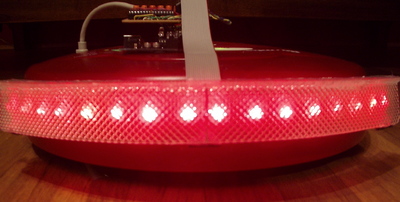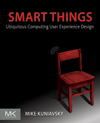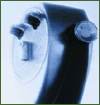My business partner in ThingM Tod continues to reach new heights in hacking Roombas. A couple of weeks ago, he built a custom circuit to give Roombas a Battlestar Galactica cylon eye...but just having moving LEDs wasn't enough, and he included a circuit that simulated the incandescent lights of the original costume. Then he stayed up all night making a parody of the new Battlestar Galactica credits.
Then, a couple of days ago, he figured out how to control Roombas using the MacBook's built-in tilt control (which has become a fascinating interface affordance in its own right).
Hacking robotic vacuum cleaners seems like a pastime--like building ships in bottles--and one of the common rhetorical questions that gets asked when these things get posted is "But why?" For me it's an important step in the developing a level of familiarity with technology and treating ubiquitous computing technologies as personal tools, rather than as mysterious "other" technology. One of the reasons why technology seems magical at first is its mysterious functionality: when it's unfamiliar, it's magical. I've argued before that magic may be valuable as a metaphor for explaining technology, but as many people have pointed out, technology is not magic and should not be presented as such literally.
I believe that part of using magic as a design metaphor should include a way to pull back the veil of the magic by familiarizing people with its actual functionality. The metaphor doesn't have to suffer--people will still understand that it's an analogy to magic, rather than a literally magical experience--but I believe it will help people position and use the technology to the fullest extent, but reducing the mystery. Showing that it's possible to hack everyday technology (especially technology that's designed to be hacked, like the Roomba) is akin to a magician explaining their tricks. The tricks aren't any less magical, but the process of revealing the actual working helps people understand themselves and their relationship to the world. That, of course, is the true brilliance of Penn and Teller's early work, which was about debunking the idea of magic, while still using magic. Hacking Roombas may not have the same impact as Penn and Teller's work, but it's a small step in clarifying the relationship between ubiquitous computing technology and people using it.




